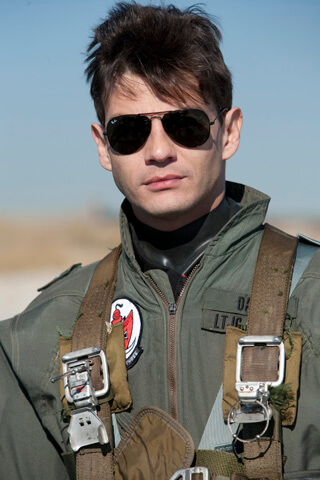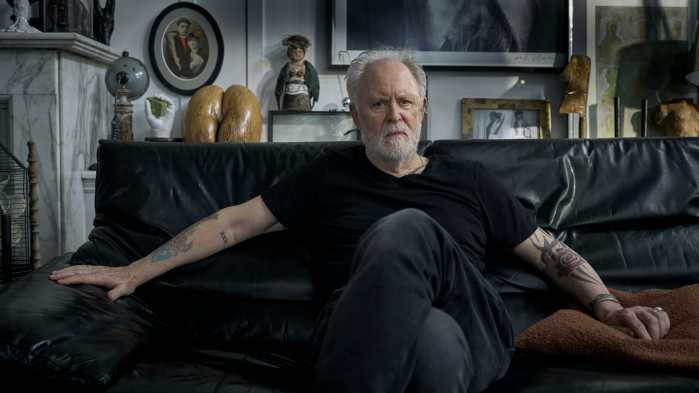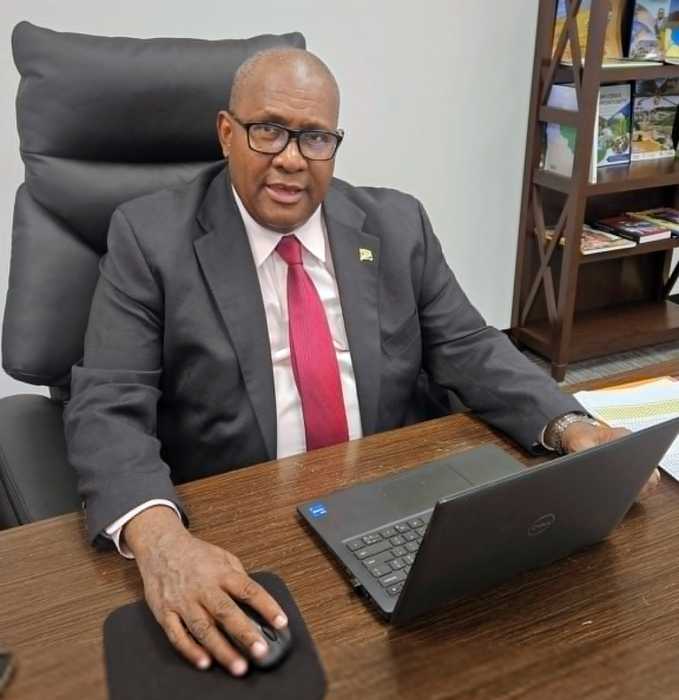Trent Ford stars as Daniel in “Burning Blue.” | LIONSGATE FILMS
BY GARY M. KRAMER | Burning Blue” is an intense, engrossing drama about a military investigation that turns up a possible “gay cell” on a Navy aircraft carrier in the bad old days of Don’t Ask, Don’t Tell. Daniel (Trent Ford) and William (Morgan Spector) are best buddies. When Matthew (Rob Mayes) enters their unit, a love triangle, tinged with jealousy, develops, even though one of the men is straight.
Writer/ director DMW (David) Greer, adapting his own play, has crafted a poignant story about masculinity and sexuality within the culture of the military. “Burning Blue” is really about wanting what others say you can’t have. The story, which concludes in 2001, is also one about dignity and individual integrity in the face of discrimination. Ford’s strong performance is freighted with Daniel’s guilt about a variety of matters.
Greer met with Gay City News to discuss “Burning Blue.”
DMW Greer’s story of homoerotic competition explores military life’s intense camaraderie
GARY M. KRAMER: “Burning Blue” began as a play. What prompted you to tell this story then and now as a film?
DMW GREER: It was a need to exorcise very deep grief. It’s a personal story but it’s a work of fiction, one very much inspired by my real life. I was in the military. I had been in love with a guy for years who was killed flying. I lost a lot of friends in aircraft accidents, but when this guy was killed, his death was the epiphany. It was the seed that was planted for me to tell the story. But the catalyst was my closest friend’s response to my telling him that I was in love with this other man.
GMK: How did he react?
DMWG: He shamed me. We were estranged from each other for almost a year.
GMK: Had you been involved with men before?
DMWG: I had relationships with men prior to this, but not anything that was as deeply profound as this. It was a platonic relationship, but it was very special and intimate.
GMK: What can you say about the homoerotic tension in the film?
DMWG: I think that human sexuality — and this is no great revelation from me — is a very, very complex and very nuanced gray area. I think that there is some element of sexual energy, sexual tension in almost every interaction, every relationship.
GMK: There is a very macho culture in the military. What can you say about this hyper-masculine culture?
DMWG: I think it’s been spun in the media that we've been fed. In America, it’s the greatest exponent of that hyper-masculine imagery and storytelling, and I think it’s inaccurate. What I’ve seen in films, the portrayal of the military always seems a bit cartoonish and broad-stroked to me. Me, and all of my contemporaries in the Navy, are — again, clichéd terms here, but — very multidimensional guys, complex individuals that have different interests and are fallible.
GMK: Do you think the military creates a homosocial society?
DMWG: I think it could, perhaps it could contribute a bit. If you believe people’s sexuality is fluid, definitely.
GMK: Despite the sexual tension in the film, you are extremely discreet in filming the sex scenes. Can you explain why?
DMWG: There is so much ambiguity in male sexuality and intimacy, and I think that is really heightened in the military setting. It was really deliberate. I didn’t want to make this about sex. What this was about was a really powerful, deep, deep love, which transcends sex. Certainly in any long-term relationship, it does over time. Love trumps everything. Sex is a great galvanizer.
GMK: The guys dancing shirtless is possibly the film’s most erotic moment.
DMWG: Imagination is a very, very powerful thing, I think, if each viewer can fill in the blanks visually and emotionally. For me, it creates a more powerful experience.
GMK: What made you join the military?
DMWG: I grew up in a military family. I was a fledgling human being. I did not have much self-possession. I was good at faking it, but I was not very clear on who I was or what my opinion or emotions were on almost anything.
GMK: You have a military background, but you now work as a filmmaker and landscape architect. How did that happen?
DMWG: I went to the Naval Academy for a year and a half and I was kicked out because my grade point average wasn’t high enough. I ended up going to Oregon State University, and I studied naval science there and landscape architecture. My degree is in landscape architecture.
My husband and I — he’s a Brit — we have a design firm and renovate apartments for people. We do this for specific clients. The military thing was probably the most disconnect. I loved part of it a lot — my friends, the camaraderie, I loved flying. Everyone in my family flew. It was in my blood. The architecture thing was something I was interested in.
GMK: Although Daniel’s character is based on your experiences, there are differences. How would you have handled what Daniel went through?
DMWG: Probably not with as nearly as much integrity and grace as Daniel did. My niece was a helicopter pilot who left because of Don’t Ask, Don’t Tell. She ended up falling in love with her roommate.
GMK: Do you think the military is more likely to persecute queer members because of their sexuality?
DMWG: Probably, yes. I think that society and culture in general view it as a form of weakness. That is what we are striving to overcome.
BURNING BLUE | Directed by DMW Greer | Lionsgate Films | Opens Jun. 6 | AMC Empire 25 | 234 W. 42nd St. | amctheatres.com




































